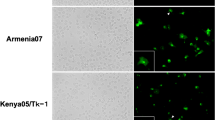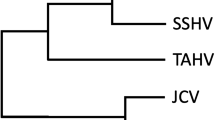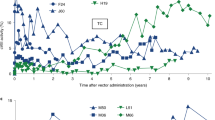Abstract
IN the course of routine passage of Moloney's leukæmogenic virus (MLV) plasma was collected from a leukæmic rat (Chester Beatty Institute outbred albino strain) which had been inoculated with MLV-containing mouse plasma when new-born. After storage at −70°C for three months the rat plasma was diluted 1 in 30 with Hanks's saline and passed through a ‘Selas 02’ filter, tested and found impervious to Esch. coli. The filtrate was injected into 15 new-born BALB/c mice, as a test of potency. Only 6 survived to weaning. On the 32nd day 5 had tumours at or near the injection site, and all had grossly enlarged spleens. Usually mice inoculated with MLV remain symptomless until they show the characteristic signs of leukæmia after 8 weeks.
This is a preview of subscription content, access via your institution
Access options
Subscribe to this journal
Receive 51 print issues and online access
$199.00 per year
only $3.90 per issue
Buy this article
- Purchase on SpringerLink
- Instant access to full article PDF
Prices may be subject to local taxes which are calculated during checkout
Similar content being viewed by others
References
Fink, A. W., and Rauscher, F. J., J. Nat. Cancer Inst., 32, 1075 (1964).
Gledhill, A. W., Brit. J. Cancer, 15, 531 (1961).
Author information
Authors and Affiliations
Rights and permissions
About this article
Cite this article
HARVEY, J. An Unidentified Virus which causes the Rapid Production of Tumours in Mice. Nature 204, 1104–1105 (1964). https://doi.org/10.1038/2041104b0
Published:
Issue Date:
DOI: https://doi.org/10.1038/2041104b0
This article is cited by
-
Targeting the RAS/RAF/MAPK pathway for cancer therapy: from mechanism to clinical studies
Signal Transduction and Targeted Therapy (2023)
-
Mutant HRas Signaling and Rationale for Use of Farnesyltransferase Inhibitors in Head and Neck Squamous Cell Carcinoma
Targeted Oncology (2023)
-
Reverse vaccinology and immunoinformatics approaches to design multi-epitope based vaccine against oncogenic KRAS
Medical Oncology (2023)
-
Computational design and validation of effective siRNAs to silence oncogenic KRAS
3 Biotech (2023)
-
Drugging KRAS: current perspectives and state-of-art review
Journal of Hematology & Oncology (2022)



